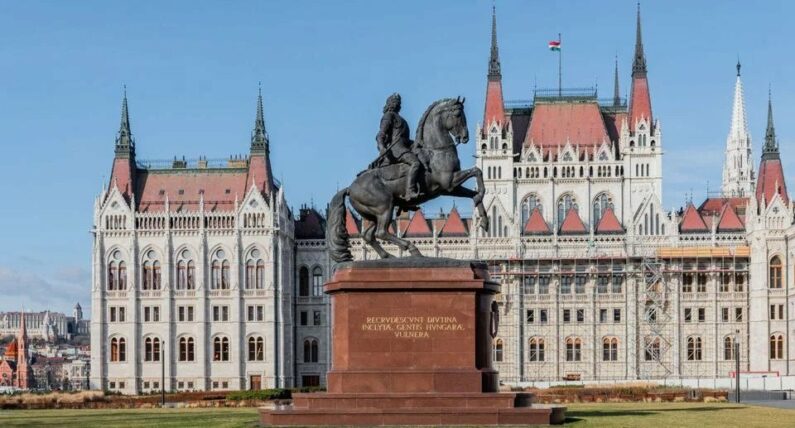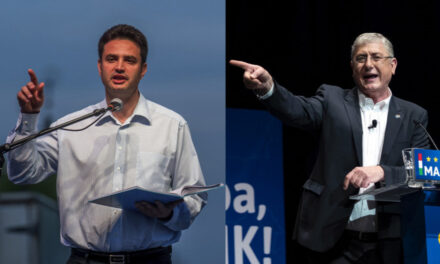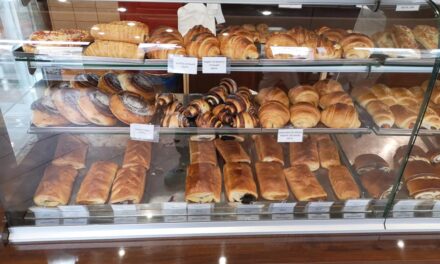"A nation that does not know its past does not understand its present, and cannot create its future!"
Europe needs Hungary... which has never let itself be defeated.
Ferenc Rákóczi in Poland
Ferenc Rákóczi, Miklós Bercsényi , and some Hungarian lords and nobles refused Vienna's offer. This meant that if they took the oath of loyalty, they could keep their estates and noble privileges. Rákóczi would have had to renounce his princely title in Transylvania in return for keeping his estates in the Highlands, Zemplén, Szatmár, and Beregi. True, in exchange for this, he would have received back his children living in Vienna. Rákóczi's historical greatness, his unquestionable loyalty to his country, and the eight-year struggle for independence led him to the decision not to negotiate with the Habsburgs. he should have forgotten the memory of his great predecessors ( Miklós Zrínyi, Péter Zrínyi, Ferenc I. Rákóczi, Ilona Zrínyi, Imre Thököly This is one of the reasons why he accepted the bitter bread of exile, but he never gave up on the liberation of his homeland and the independence of Transylvania.
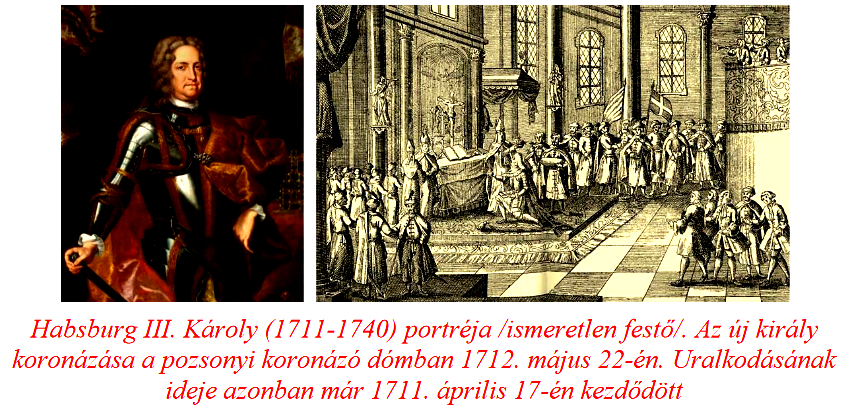
Many people - including his contemporaries, but also some of the later analysts - considered Rákóczi's departure to Poland to be an escape. We cannot accept this view, since he devoted his whole life to the liberation of his country from Vienna. It is much more plausible that Poland was the place where he tried, could try to revive the freedom struggle. the Russian Tsar Peter I in Jaworów (a Polish town east of Jarosław, now part of Ukraine) , who received the prince with great respect. In contrast, the Western powers had already renounced their support for the Hungarian freedom struggle, and what's more, Rákóczi was simply considered a rebel. The Kuruc leader was especially outraged by XIV. Lajos's turning away from the cause of the Hungarians, since he supported it so enthusiastically while it was in his interest. It is also true that the Russians had more trouble dealing with the renewed conflict with the Swedes and the Turks than Hungary's struggle for independence. Although Rákóczi was offered the Polish crown twice, which was also supported by Czar Péter I, the ruling prince did not accept it. He lived incognito in Dancka (Gdansk) under the name Count of Sáros. Rákóczi did not recognize the peace of Szatmár. Referring to the fact that József I , in whose name the peace was signed, was concealed in Vienna. (At this time, Charles III sitting on the Hungarian throne.) By the summer of 1711, all European rulers involved knew that the Hungarians' struggle for freedom had failed.
The new king convened a parliament in 1712, at which the Hungarian nobles, who had returned to the emperor's loyalty, sanctified the will of the Habsburgs. Julianna Korponayné Géczy is related to the 1712 parliament , immortalized by Mór Jókai in her novel The White Woman from Lőcsei Rákóczi used the title Count of Sáros because he did not have to maintain a princely court with his dwindling money. He sent most of the fugitives from Poland home, including the sixty young nobles whose prosperity he saw as more certain in their homeland. However, many did not dare, could not go home, so they scattered to many countries in Europe. Their lives and fate are well expressed in a stanza of the song of the refuge:
"I fought for the homeland, / for God and freedom!
I now eat my bread with a boo, / I've become a bully."

Rákóczi and his handful of entourage could only leave Poland with great difficulty. Among others, Ádám Vay and the young Mikes Kelemen were with him. In the end, Rákóczi agreed with the captain of the English merchant ship named Szent György to transport them to Great Britain.
Ferenc Rákóczi's journey to Western Europe
On November 9, 1712, the ship leaving the port of Dancka ran into a strong storm in the Baltic Sea. Unaccustomed to the vicissitudes of the sea, Rákóczi was already prepared for the ship to sink. According to the Roman Catholic liturgy, he prepared for death and accepted God's will. However, the storm stopped after a few days, and Saint George's ship bypassed Denmark, sailed through the North Sea and docked in the port of Hull, England. A shameful scene took place when the hero and leader of the Kuruc War of Independence could not set foot on the land of Great Britain, founded on May 1, 1707, in the homeland of democracy. (England and Wales, which it had already conquered, entered into an alliance with Scotland. The three countries were united into one state. This is how the Kingdom of Great Britain was created. A part of Ireland only became part of Great Britain later.) The ruler in this period was Queen Anne Stuart , who yielded to the protests of the Viennese court. He considered Rákóczi a rebel and not a national hero fighting for the freedom of his country. For the sake of completeness, it should be added that the negotiations that ended the War of the Spanish Succession took place in Utrecht in the Netherlands. The success of the peace treaty was significantly disturbed by Rákóczi's appearance in the West.

The English sent Rákóczi to France, and to help him, they even put a ship at his disposal. On January 13, 1713, the Hungarians set sail and set off for the French coast. The storm on the English Channel again put the lives of Rákóczi and his companions in danger. After the adventurous journey, they reached the French coast on the pier of Dieppe. From there, the Hungarians traveled to Rouen, where the governor of Normandy, the Duke of Luxemburg, received the refugees. On February 12, 1713, in Versailles, the king himself, XIV. Lajos hosted Rákóczi and his entourage. In the first decades of the 18th century, the once brilliant and rich French court became indebted as a result of many wars and the wasteful lifestyle of the nobility. The splendor and wealth worthy of the Sun King were only superficial. Signs of decline and ever-increasing debt left their mark on the Parisian superpower. Feudal France was in a general crisis, only the bankers could be satisfied.
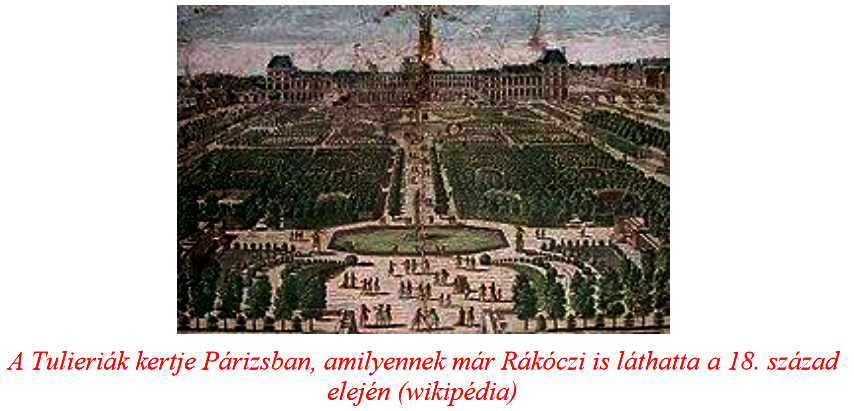
The Hungarian prince was liked by many in the Parisian court. Despite the fact that the French's political goals were not favored by the presence of the former ally. Saint-Simon, who is critical of everyone, wrote about him: "Wise, modest, moderate ... he is kind and intelligent, very polite, but he is quite selective with whom he speaks. … there is a lot of dignity in him, without anything in his manner that could suggest glory. ... He is an extremely honest, upright, true, and brave man to the end."
After the conclusion of the Peace of Utrecht, Rákóczi personally met XIV. with Lajos, but their discussion did not lead to results. The Sun King also did not undertake the confrontation with Vienna, given that the French-Austrian peace negotiations were proceeding only haltingly anyway. It is characteristic that in the text of the peace treaty, the freedom struggle of the Kurucs and the name of Rákóczi were not even mentioned. Even the sources of money that had been trickling in until now dried up, and Rákóczi only got a small annuity. The Hungarian refugees who remained in Poland were in an even more miserable situation, led by Ádám Vay . Meanwhile, in 1714, an uprising broke out in the county of Szepes due to poverty and increasing oppression, which the emperors smothered in blood. Their leaders were executed, Czelder Orbán was quartered in medieval fashion. (Apparently, the Habsburgs did not learn from the international outrage following the Eperjes bloodbath that took place only 27 years earlier.)
In the French court, the prince's name was also muddied. It turned out that in the palace rented for the Hungarian entourage, the French officers - who wanted to help the Kuruc leaders' financial situation - engaged in illegal gambling. The fate of the emigrants worsened when the Sun King died on September 1, 1715. For Rákóczi, this was a tragedy, since the person of the king offered him protection, and now even that has ceased. The police initiated proceedings against Rákóczi's entourage, which ended with them having to leave the Hotel de Transylvanie in Paris.
Rákóczi in Grosbois
After the lively life in Paris, Rákóczi chose peace and solitude. Rákóczi, who was unshakable in his religious faith, found this not unusual way of life for him in Grosbois, a monastery deep in the forest. The Kamaldul monks, who followed a quiet, meditative life of faith, offered not only shelter, but also spiritual brotherhood to the Hungarian prince. Bishop Jansen who lived in the 16th century , with which Rákóczi was already familiar. The doctrines based on strict morality, a deepened spiritual life, and divine grace significantly helped Rákóczi to steer his previously troubled life into a calm bed. However, this did not mean that he turned away from the world. He visited Paris, supported the refugees who stayed there, and especially the young people, he paved the way with great love. It is thanks to him that the son of the major general, László Bercsényi, had a brilliant career in France. He founded the French hussars, and one of the regiments of the French army bears Bercsényi's name to this day. Here, in Grosbois, the prince began to write his Confessions, and here he also wrote his other important work, Memoirs. He couldn't have found a more suitable environment or place, since it was here that he found solitude and immersion. He rented a house for himself in the Kamaldu monastery near the village of Yerres, located about 23 kilometers from Paris, where he permanently retired after the death of the French king. Rákóczi, who received a Jesuit upbringing, had to go through a serious self-examination in order to accept the Kamaldulian way of life, which was the exact opposite of the Jesuits' secular, militant monastic order, which was considered the vanguard of the Counter-Reformation.
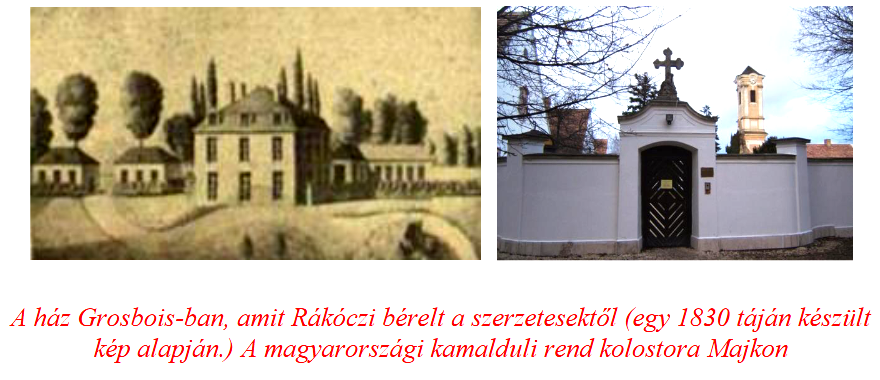
It should be known that the secular and ecclesiastical leaders of the Hungarian monastery always participate in the commemorations keeping the memory of Rákóczi alive in Yerres, France.

Exile to Turkey
When Rákóczi and the small entourage that remained with him boarded a ship in Marseille on September 16, 1717, they secretly hoped that they would be able to return to their homeland, Hungary, later.
The French court was happy with the departure of its former allies, because Rákóczi was already a heavy burden for Paris in concluding the peace with the Austrians. The forty Hungarian refugees arrived in Gallipoli, Turkey, on October 10, 1717, touching Spain. Although the Turks gave Rákóczi a ceremonial welcome, the Porta did not want to hear about him providing military support to the Hungarians. It is true that Kurucs also fought in the Turkish-Tatar army that invaded Hungary, but this only worsened Rákóczi's chances. After all, the population only suffered robbery and destruction caused by the Tatars. The small Kuruc troops were not able to revive the freedom struggle. The remnants of the Ottoman Empire had only enough military power to prevent the further advance of the Habsburgs in the Balkans. On July 21, 1718, the Pozarevac Peace was concluded under such conditions. ( It is located in the central part of today's Serbia.) To the Porta's credit, it did not hand over the fugitives even after years of demands from Vienna. All the sultan did was to place Rákóczi and his entourage not in Istanbul, but in nearby Jenikoj. III. Emperor Charles, however, carried out further mine work against the Hungarians. The Habsburg court finally achieved that on April 16, 1720, the Porte placed Rákóczi and his companions on the distant coast of the Sea of Marmara, in Rodosto (today Tekirdag).


After a while, Miklós Bercsényi , along with his wife Krisztina Csáky, Simon Forgách, Antal Esterházy, Mihály Csáky, Miklós Sibrik, Zsigmond Zay and a few others. Mikes Kelemen may be appropriate for the lord's companions , according to which: "I had no reason to leave my country, only that I loved the prince very much." Bercsényi, who moved in with the prince, described Rodosto with an apt anagram when he christened it Ostorod. In the Armenian-populated district of Rodostó, the Hungarian lodgers settled down to a simple, everyday life, which was determined by the prince's lifestyle. Let's quote Mikes Kelemen's description again: "At half past six in the morning the drum is beaten, then the servants have to get up and be ready for six o'clock. At six o'clock they beat the drums and then the prince gets dressed. Then we drink coffee and smoke. When the clock strikes three past eight, the first bell is played for mass, at eight the second is played, and a little later the third is played. At that time, the prince goes to mass, after mass he goes to his house and wherever he likes. At twelve-thirty they beat the drum for lunch and at twelve we sit at the table and lay down the law for the hens. At half past three, the prince goes to the chapel alone and stays there until three o'clock. When the clock strikes three to five, the first bell is played for evening prayer, the second at five, and a little later the third - then I go to the prince's chapel and then everyone disperses. They play drums for dinner at half past seven. Dinner does not last long, the prince undresses at eight o'clock, but most often he does not go to bed even then, and in the morning, even if he gets dressed at almost six o'clock, he gets up at two o'clock in the morning."
Rákóczi's daily life included writing and reading, then in the afternoon he drilled, carved, turned, and most of the time made furniture.

However, many people could not stand this lifestyle.
Especially the young people, many of whom signed up for László Bercsényi's hussar regiment, which the count organized in France. No matter how much the prince lived in seclusion, he did not give up his original plans. He monitored European political life and believed in the formation of a Franco-Russian coalition against Austria. Sarolt Amália , died in a nunnery on February 18, 1722 . In these years, many people died in Rodosto as well, and death was among the exiled Hungarians. The plague, a lot of suffering, privation, homesickness, aimlessness crushed the refugees. The political news coming from Vienna also destroyed the Rodost community. The 1722-1723. Pragmatica Sanction was adopted at the Parliament in Bratislava in 2010, which decided not only on the right of daughter inheritance. A tragic moment in Hungarian history occurred when the Hungarian nobility participating in the parliament renounced the independence of their country. About the independence for which Ferenc Rákóczi fought for eight years, for which thousands of people died, and whose resignation plunged the country into unprecedented misery. Adding to the series of tragic events was the death of Miklós Bercsényi on November 6, 1725. In June 1727, his son, György Rákóczi, visited his father. The young man, who was already 26 years old at the time, appeared aimlessly in Vienna, Paris, and Rodosto. He didn't last long with his father either, after a few months he almost ran away from the barren, boring Rodosto and returned to Paris. He lived here under an alias (Count Terislaw), then in 1742 he traveled to Turkey again at the invitation of the Sultan. The Porte wanted to use it to occupy the throne of the Principality of Transylvania, but it refused. He returned to Paris and died there in the summer of 1756. With this, the princely male branch of the Rákóczi family became extinct.

József lived an even bleaker, uneventful life than his younger brother. In Vienna, they were brought up to live a life of lechery, forgetting the past of their ancestors. He got an estate in Sicily in order to be as far away from his family and his homeland as possible. József Rákóczi assumed the title of "Prince of Munkacci" after his father. A year later, the Sultan invited him to Turkey to install him on the throne of Transylvania. Neither he nor later his brother accepted this. József arrived in Rodostó in 1736 - one year after his father's death. The Porta provided military assistance to Rákóczi's son, who reached the border of Transylvania at the head of a small force. However, he could no longer enter the land of his ancestors. Mikes Kelemen also took part in the military action, and that was the last time he saw the Carpathians. The tormenting homesickness left its mark on his entire life. However, the Turk did not think seriously about the return of the Rákóczi boy to Hungarian soil, since he was also negotiating with Vienna behind the backs of the Hungarians. József Rákóczi fell ill in Cernavoda near the Black Sea (now Romania) and died in 1738. The Bujdosos were very disappointed that the prince, who had great talent and faith and sacrificed his life for the Hungarian nation, had descendants with such modest abilities. Mikes Kelemen rightly wrote "... we have to look sadly at the great difference between the father and the son. The apple fell very far from the tree."
The death of the prince
Twenty years after the end of the war of independence, there was still hope among the living members of the Rodosto shelters that the Habsburg yoke could be shaken off. In 1733, after the death of the Polish king (August II ), another succession war was unfolding. The European rulers also expected Rákóczi to appear on the scene, but then everything in the political witch's kitchen turned to ashes. Moreover, the prince was betrayed again, surrounded by unworthy people. It was only with difficulty that he managed to clarify his innocence. Both this personal disappointment, Hungary's hopeless situation, and the excruciating pain of homesickness took their toll on the fifty-ninth-year-old prince.

In the spring of 1735, the ruling prince was already very weak and fell ill a lot. Kelemen Mikes, the irreplaceable chronicler from Rodost, noted that Rákóczi was still working on his lathe in the first days of April, but he was so weak that he could not even go to church on Palm Sunday. On the Good Friday before Easter, he received the last anointing from his priest in the early hours of the morning. And at three o'clock in the morning, the tragedy occurred: "Finally, after 3 o'clock this morning, the poor man fell asleep, giving his soul to God, because he died like a child." The great son of our nation has passed away from the ranks of the living, and even his death testifies to his strong faith, the hope of resurrection, and immortality. After all, Christians remember Christ's suffering and crucifixion on Good Friday. In such cases, we can say that nothing happens by chance. Even decades later, the Hungarians "waited" for Rákóczi, believing that he would come again and lead his people. His popularity was not based on his rank, fame, or historical name, but on his humanity, justice, and endurance. (Similar, "eternal" historical figures were Saint László, King Matthias , and Lajos Kossuth , or our great poet, Sándor Petőfi. )
 On July 6, 1735, his faithful companion, Kelemen Mikes, took his body to Istanbul with the permission of the Porte, and the Jesuits there placed it in the St. Benedict's Church in their possession. Rákóczi's last will was fulfilled when he could sleep his eternal dream next to his mother, Ilona Zrínyi. His heart was placed in Yerres, France, in the church of the Camaldulians - in memory of the Grosbois years. (The box containing the prince's heart disappeared during the French Revolution that destroyed the church in 1789.) However, the residents and leaders of the small French town still remember the Hungarian prince and pay their respects with wreaths and a ceremony at the monument on Rákóczi Square.
On July 6, 1735, his faithful companion, Kelemen Mikes, took his body to Istanbul with the permission of the Porte, and the Jesuits there placed it in the St. Benedict's Church in their possession. Rákóczi's last will was fulfilled when he could sleep his eternal dream next to his mother, Ilona Zrínyi. His heart was placed in Yerres, France, in the church of the Camaldulians - in memory of the Grosbois years. (The box containing the prince's heart disappeared during the French Revolution that destroyed the church in 1789.) However, the residents and leaders of the small French town still remember the Hungarian prince and pay their respects with wreaths and a ceremony at the monument on Rákóczi Square.
At the intercession of Kelemen Mikes, the internal parts of his body were buried in Rodosto, in the Greek church. The tomb in Istanbul was first mentioned in 1848/1849. The Hungarians who fled to Turkey during the 1960 war of independence, and then scientific expeditions researching the prince's memory made news. As a result of long preparatory work and years of negotiations, the ashes of the Kuruc exiles were finally able to return home to Hungarian soil.
Rákóczi lives on...
The refugees from Poland and Turkey died one by one. Mikes Kelemen, a loyal companion who was still waiting for Zágon in the last minute of his life, passed away in 1761. It is recorded that the last kuruc, István Horváth , died in 1799, reportedly at the age of 120. After the compromise, the opportunity to express national sentiments was again offered. In addition to the person of Lajos Kossuth, still living in Turin, the memory of Ferenc Rákóczi also developed more and more. The two wars of independence were mentioned by more and more people and more and more frequently, which of course provoked Vienna's dislike. The poet and writer Kálmán Thaly was at the forefront of creating the Rákóczi cult, who dedicated years to perpetuating the historical role of the prince. (His activity is of great importance even if we know that he was sometimes carried away by well-intentioned fantasizing.)
 Hungarian virtuosity was also needed in order for the grand plan to be crowned with success. On October 29, 1906, the ashes of Rákóczi and his buddies were laid to rest in the St. Elizabeth's Cathedral in Kassa amid great celebrations. The poor Hungarians could not know that a decade later, behind the scenes, the fate of Kassa and many other cities, the memorial sites of the Carpathian Basin, had already been decided, that the thousand-year-old borders of Historic Hungary would cease to exist, which was shamefully finalized on June 4, 1920.
Hungarian virtuosity was also needed in order for the grand plan to be crowned with success. On October 29, 1906, the ashes of Rákóczi and his buddies were laid to rest in the St. Elizabeth's Cathedral in Kassa amid great celebrations. The poor Hungarians could not know that a decade later, behind the scenes, the fate of Kassa and many other cities, the memorial sites of the Carpathian Basin, had already been decided, that the thousand-year-old borders of Historic Hungary would cease to exist, which was shamefully finalized on June 4, 1920.
The coffins arriving from Istanbul by boat on the Black Sea were transported to Hungary by a special train departing from Constanta. On October 26, 1906, the train rolled across the Hungarian border at Orsova. (Perhaps it was no coincidence that it was exactly where Kossuth and his companions left Hungary in 1849.) The train, traveling on the route Karánsebes-Lugos-Temesvár-Szeged-Kiskunfélegyháza-Kecskemét-Nagykőrös-Cegléd, on October 28, 1906, in the morning he ran into Keleti railway station in hours. The stations were decorated and received the ashes of those buried amidst the ringing of bells, while they greeted the illustrious son of our country with festive speeches. The coffins were buried in the Szent István Basilica, while the ashes of the evangelical Imre Thököly were buried in the Deák tér church.

In the evening, the coffins were returned to Keleti. From there, traveling on the Gödöllő-Hatvan-Füzesabony-Miskolc-Szerencs-Sárospatak-Sátoraljaújhely railway line, the train arrived at Kassa on the morning of October 29. In the first car II. Ferenc Rákóczi, Ilona Zrínyi and József Rákóczi in the second, Miklós Bercsényi and Krisztina Csáky in the third, Imre Thököly, Antal Esterházy, Ádám Vay and Miklós Sibrik in the fourth. Rákóczi and his relatives were laid to rest in Kassa, Imré Thököly in Késmárk, and Ádám Vay in Vay.
Especially in Zemplén - Rákóczi's land - there were moving celebrations and sincere tributes to the memory of the great son of our country. Memorial fires were lit in the settlements where Rákóczi visited at the time. The singers sang kuruc notes accompanied by the stirring voice of the tárogáts.
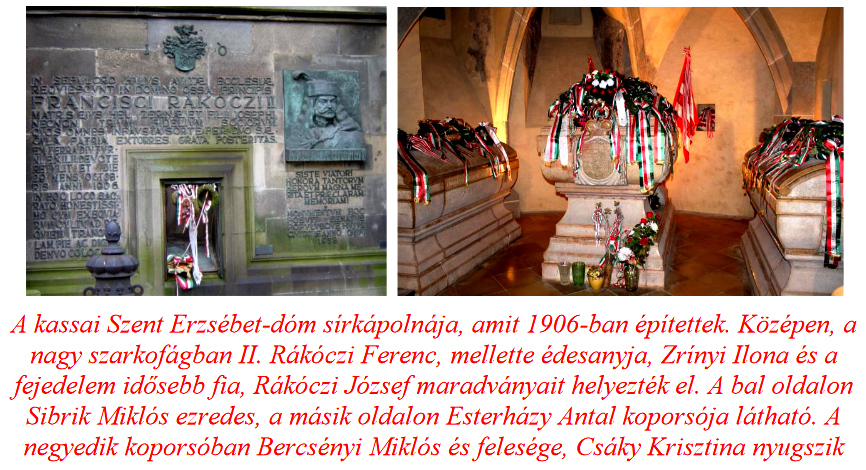
Then the fires went out, the singing died down for a while, but the memorials, statues, buildings, Rákóczi trees, institutions, exhibitions still promote and preserve the memory and historical greatness of the great son of our people.
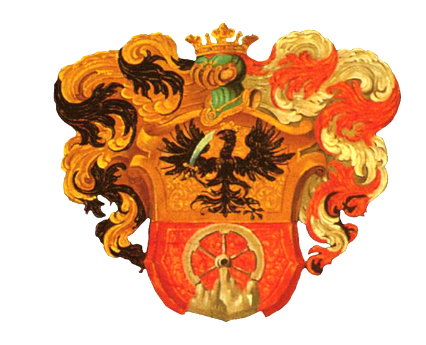
Author: historian Ferenc Bánhegyi
(Header image: köztérkép.hu)
The parts of the series published so far can be read here: 1., 2., 3., 4., 5., 6., 7., 8., 9., 10., 11., 12., 13., 14., 15., 16., 17., 18., 19., 20., 21., 22., 23., 24,, 25., 26., 27., 28., 29/1.,29/2., 30., 31., 32., 33., 34., 35., 36., 37., 38., 39., 40., 41., 42., 43., 44., 45., 46., 47., 48., 49., 50., 51., 52., 53.

